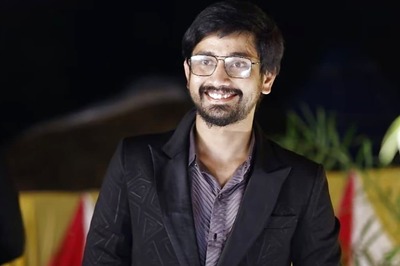
views
Beginning in July this year, the Gates Foundation will receive a tranche of Berkshire Hathaway shares annually from the "sage of Omaha". Statistics tell a revealing tale: At current valuation, his 2006 donation is worth about $1.5 bn. The overall value of Buffett's donation to the Gates foundation is estimated to be somewhere between $30 bn and $37 bn making it the largest charitable gift in history.
The question this stupendous act of giving provokes is why did he not leave everything to his three children? In continuing with America's proud tradition of munificence, Buffett enunciated, "the idea that you hand over huge positions in society simply because someone came from the right womb...I think it's almost un-American". Of course, he admitted that his children will receive substantial sums of money but he also outlined his belief that, "a very rich person should leave his kids enough to do anything but not enough to do nothing."
Buffet's philosophical underpinning has a depth and significance that deserve much closer attention. As a nation, America attracts more scorn from outsiders than perhaps most other countries. From trenchant Marxists, die-hard liberals to Islamic fundamentalists dreaming of a Caliphate, critics of America forge an unlikely "coalition of the willing". While no country is perfect and sometimes criticism may be even be well founded, there is a fashionable tendency to pour vitriol over America without any detailed intellectual interrogation. Consequently, some of the inherent goodness and virtues of the egalitarian American ethic - symbolized by the American dream - are easily overlooked.
At the core of Buffet's charitable intent, there is an implicit recognition of dignity and equality that is so intrinsic to the country. Herein lies the American paradox. America is reviled for its inequity but it is also a society where immigrants are most likely to succeed and where people are most likely to give something back to their communities. The huge endowments that American universities boast attest to this. For example, Harvard has an endowment worth about $30 bn which funds graduate degrees quite generously. In comparison Oxford and Cambridge have about $3 bn each.
Lest we forget, India too has its own tradition of philanthropy. Some of India's most wealthy communities are also its most giving. As a non-exhaustive example, the Jain fraternity stands out. More specifically, in the crescendo of crafted political anxiety over reservations, there has been an unthinkingly demonizing analysis of corporate India, which lamentably ignores the positive contributions of business houses to Indian civil society. For example, behind Bangalore's Indian Institution of Science lies a substantial contribution from the Tata's. Similarly, BITS Pilani immortalizes a Birla endowment.
To return then to the overarching theme, while critics of the capitalist model often succumb to the simplistic analysis of treating wealth as an evil influence and prefer to impose their trust with greater centralization, the logic of experience has coherently challenged this tendentious worldview. An ownership society that encourages individual achievement is better placed to deliver greater prosperity and happiness than a society limited by the unimaginative solutions of a bureaucratic state.
In continuing with a culture of giving that ennobles dignity of labour and seeks to pierce the disadvantages conferred by birth, the 'sage of Omaha' has highlighted all that is best about America which its detractors sometimes conveniently overlook. Indeed, seen as such Warren Buffet's incredible donation to the cause of wider humanity is a validation that capitalism and social justice are not mutually exclusive.
Rishabh Bhandari is a lawyer at a global law firm in London. These are his personal views. first published:July 03, 2006, 11:39 ISTlast updated:July 03, 2006, 11:39 IST
window._taboola = window._taboola || [];_taboola.push({mode: 'thumbnails-mid-article',container: 'taboola-mid-article-thumbnails',placement: 'Mid Article Thumbnails',target_type: 'mix'});
let eventFire = false;
window.addEventListener('scroll', () => {
if (window.taboolaInt && !eventFire) {
setTimeout(() => {
ga('send', 'event', 'Mid Article Thumbnails', 'PV');
ga('set', 'dimension22', "Taboola Yes");
}, 4000);
eventFire = true;
}
});
window._taboola = window._taboola || [];_taboola.push({mode: 'thumbnails-a', container: 'taboola-below-article-thumbnails', placement: 'Below Article Thumbnails', target_type: 'mix' });Latest News
At first instance, to speak of capitalism and philanthropy in the same vein might seem like an oxymoron of sorts to some, a bit like speaking of socialist landlords or military intelligence. However, the beauty of experience and reason lies in forcing us to steer ourselves away from our preconceived notions and myths toward new ideas and wider boundaries. Warren Buffett's remarkable decision to give away most of his Berkshire Hathaway fortune to the Bill & Melinda Gates foundation is a stunning act of philanthropy that ought to make those often critical of capitalism pause for reflection.
Beginning in July this year, the Gates Foundation will receive a tranche of Berkshire Hathaway shares annually from the "sage of Omaha". Statistics tell a revealing tale: At current valuation, his 2006 donation is worth about $1.5 bn. The overall value of Buffett's donation to the Gates foundation is estimated to be somewhere between $30 bn and $37 bn making it the largest charitable gift in history.
The question this stupendous act of giving provokes is why did he not leave everything to his three children? In continuing with America's proud tradition of munificence, Buffett enunciated, "the idea that you hand over huge positions in society simply because someone came from the right womb...I think it's almost un-American". Of course, he admitted that his children will receive substantial sums of money but he also outlined his belief that, "a very rich person should leave his kids enough to do anything but not enough to do nothing."
Buffet's philosophical underpinning has a depth and significance that deserve much closer attention. As a nation, America attracts more scorn from outsiders than perhaps most other countries. From trenchant Marxists, die-hard liberals to Islamic fundamentalists dreaming of a Caliphate, critics of America forge an unlikely "coalition of the willing". While no country is perfect and sometimes criticism may be even be well founded, there is a fashionable tendency to pour vitriol over America without any detailed intellectual interrogation. Consequently, some of the inherent goodness and virtues of the egalitarian American ethic - symbolized by the American dream - are easily overlooked.
At the core of Buffet's charitable intent, there is an implicit recognition of dignity and equality that is so intrinsic to the country. Herein lies the American paradox. America is reviled for its inequity but it is also a society where immigrants are most likely to succeed and where people are most likely to give something back to their communities. The huge endowments that American universities boast attest to this. For example, Harvard has an endowment worth about $30 bn which funds graduate degrees quite generously. In comparison Oxford and Cambridge have about $3 bn each.
Lest we forget, India too has its own tradition of philanthropy. Some of India's most wealthy communities are also its most giving. As a non-exhaustive example, the Jain fraternity stands out. More specifically, in the crescendo of crafted political anxiety over reservations, there has been an unthinkingly demonizing analysis of corporate India, which lamentably ignores the positive contributions of business houses to Indian civil society. For example, behind Bangalore's Indian Institution of Science lies a substantial contribution from the Tata's. Similarly, BITS Pilani immortalizes a Birla endowment.
To return then to the overarching theme, while critics of the capitalist model often succumb to the simplistic analysis of treating wealth as an evil influence and prefer to impose their trust with greater centralization, the logic of experience has coherently challenged this tendentious worldview. An ownership society that encourages individual achievement is better placed to deliver greater prosperity and happiness than a society limited by the unimaginative solutions of a bureaucratic state.
In continuing with a culture of giving that ennobles dignity of labour and seeks to pierce the disadvantages conferred by birth, the 'sage of Omaha' has highlighted all that is best about America which its detractors sometimes conveniently overlook. Indeed, seen as such Warren Buffet's incredible donation to the cause of wider humanity is a validation that capitalism and social justice are not mutually exclusive.
Rishabh Bhandari is a lawyer at a global law firm in London. These are his personal views.



















Comments
0 comment